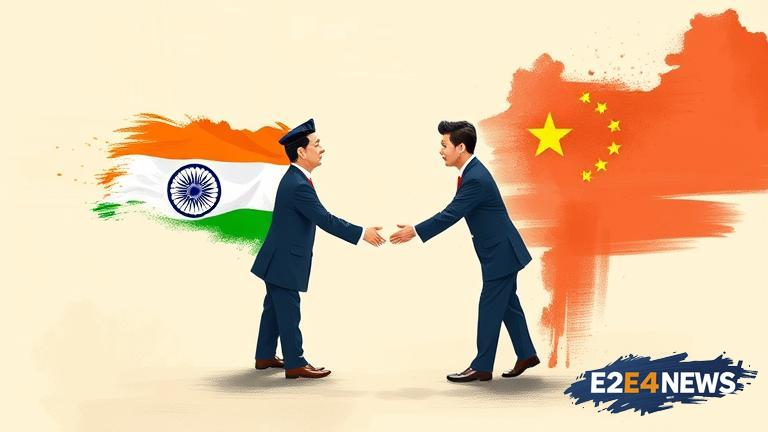The relationship between India and China has been complex and often tense in recent years, with border disputes and trade disagreements causing friction between the two nations. However, in a significant development, the two countries have been engaging in diplomatic talks and have made progress in resolving some of their outstanding issues. The recent meeting between Indian Prime Minister Narendra Modi and Chinese President Xi Jinping on the sidelines of the Shanghai Cooperation Organization (SCO) summit marked a new era of diplomacy between the two nations. The talks focused on strengthening bilateral ties, enhancing economic cooperation, and addressing border disputes. Both leaders acknowledged the need to improve communication and build trust to avoid misunderstandings and miscommunications that have led to tensions in the past. The Indian government has been keen to resolve the border dispute in eastern Ladakh, where troops from both countries have been locked in a standoff since 2020. China, on the other hand, has been pushing for greater economic cooperation, including increased trade and investment. The two countries have also been discussing ways to enhance people-to-people exchanges, including cultural and educational exchanges. Despite the progress made, there are still several challenges that need to be addressed, including the issue of Chinese investments in India and the trade deficit between the two countries. India has been seeking greater market access for its goods and services in China, while China has been pushing for greater investment in India’s infrastructure sector. The two countries have also been discussing ways to cooperate on regional and global issues, including counter-terrorism and climate change. The improvement in India-China relations is also seen as a positive development for the region, as it could help to reduce tensions and promote stability in the Asia-Pacific region. The Indian government has been keen to engage with China on regional issues, including the development of the Bangladesh-China-India-Myanmar (BCIM) economic corridor. China, on the other hand, has been pushing for greater cooperation on its Belt and Road Initiative (BRI), which aims to connect China with other parts of Asia, Europe, and Africa through a network of roads, railways, and sea routes. The improvement in India-China relations is also expected to have a positive impact on the global economy, as the two countries are among the world’s largest economies and have a significant impact on global trade and investment. However, there are still several challenges that need to be addressed, including the issue of trade protectionism and the need to promote greater economic cooperation and integration. The Indian government has been keen to promote greater economic cooperation with China, including through the development of special economic zones (SEZs) and the promotion of trade and investment. China, on the other hand, has been pushing for greater cooperation on regional and global issues, including counter-terrorism and climate change. The improvement in India-China relations is a significant development, as it could help to reduce tensions and promote stability in the region. The two countries have a long and complex history, with periods of cooperation and conflict, and the current improvement in relations is seen as a positive development. The Indian government has been keen to engage with China on regional and global issues, including the development of the BCIM economic corridor and the promotion of trade and investment. China, on the other hand, has been pushing for greater cooperation on its BRI, which aims to connect China with other parts of Asia, Europe, and Africa through a network of roads, railways, and sea routes. The improvement in India-China relations is also expected to have a positive impact on the global economy, as the two countries are among the world’s largest economies and have a significant impact on global trade and investment. The two countries have also been discussing ways to enhance people-to-people exchanges, including cultural and educational exchanges. The Indian government has been keen to promote greater cultural exchange between the two countries, including through the development of cultural centers and the promotion of tourism. China, on the other hand, has been pushing for greater educational exchange, including through the development of scholarships and exchange programs. The improvement in India-China relations is a significant development, as it could help to reduce tensions and promote stability in the region. The two countries have a long and complex history, with periods of cooperation and conflict, and the current improvement in relations is seen as a positive development. The Indian government has been keen to engage with China on regional and global issues, including the development of the BCIM economic corridor and the promotion of trade and investment. China, on the other hand, has been pushing for greater cooperation on its BRI, which aims to connect China with other parts of Asia, Europe, and Africa through a network of roads, railways, and sea routes.
